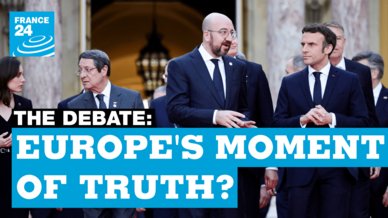EU leaders to boost Ukraine military aid, bolster bloc’s defences
Issued on:
EU leaders meeting in France on Friday looked to double financing for military aid to Ukraine by an extra €500 million as Russia’s war also spurred vows from the bloc to bolster its own defences. Watch their press conference live from 2:40 pm Paris time (GMT+1).
EU leaders gathering at the famed Versailles Palace near Paris described Moscow’s attack on Ukraine as a wake-up call for the 27-nation bloc to take a more muscular approach to ensuring its security.
The bloc’s foreign policy chief Josep Borrell said he expected the leaders to sign off on a proposal to expand the spending package that has seen the bloc fund weapons going to Ukraine.
The EU last month broke a long-standing taboo by agreeing to pay for arms deliveries to Ukraine after Russian President Vladimir Putin launched the invasion of his pro-Western neighbour.
The move was part of a broad push by Ukraine’s allies to send weapons amid desperate pleas from Kyiv for more support to help it fight off the Kremlin’s advancing forces.
Officials said the new tranche of money would go towards reimbursing EU nations that were unilaterally sending arms requested by Kyiv.
Ukraine has been pushing for its allies to supply air defence systems to help prevent Russian bombings after the West rebuffed calls to impose a no-fly zone.
‘Invest more’
As the EU has broken new ground in sending arms abroad it has also been shocked into reconsidering its approach to security after decades relying on US-led NATO to ensure Europe’s defences.
Leaders were due to commit “to increase substantially defence expenditures” and bolster cooperation on defence projects between member states at the talks at the historic Palace of Versailles.
“We must resolutely invest more and better in defence capabilities and innovative technologies,” said a draft version of the final summit declaration seen by AFP.
Europe’s moment of truth? Russian invasion of Ukraine tests EU’s resolve

Leaders have described the Russian assault that began last month as a turning point on a level with the September 11 attacks that rocked the US over two decades ago.
“On defence, I think everybody has agreed that things have changed since 24th of February and we should go back to the fundamentals,” said Estonian Prime Minister Kaja Kallas.
She said leaders needed to weigh issues such as whether to “procure common capabilities, for example, that are too expensive for any individual state to buy on their own.”
She also called for all EU members states – six of which are not in NATO – to mirror the military alliance’s commitment to spend at least 2 percent of GDP on defence.
Germany’s historic U-turn
Collective security in the European Union is primarily handled by the US-led NATO alliance, but France, the EU’s biggest military power, has been spearheading calls for an enhanced role for the bloc.
The assault on Ukraine has now pushed some key countries that have typically been more wary of spending big on their militaries into stark about-turns.
Germany tore up decades of policy by agreeing to send weapons to Ukraine after the start of the war and has pledged an extra €100 billion ($110 billion) to help improve its armed forces.
Western allies remain adamant that they will not intervene militarily in Ukraine and have instead focused on punishing Russia with a barrage of unprecedented sanctions.
“We are doing a lot and we are making even harder sanctions as we speak,” said Finnish Prime Minister Sanna Marin.
“But, but of course, we also want to make sure that the situation doesn’t escalate any further that we don’t end up in World War III.”
The EU says it is ready to impose new punishment on Moscow but there has been no agreement to follow the US lead and cut off Russia’s key oil and gas exports.
(FRANCE 24 with AFP)
For all the latest health News Click Here

